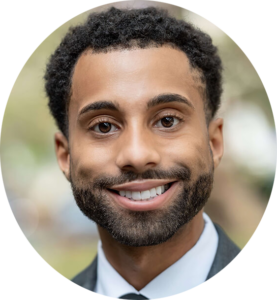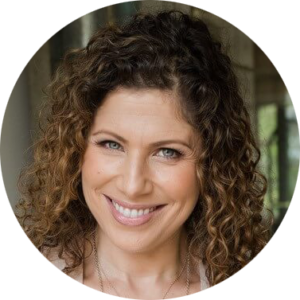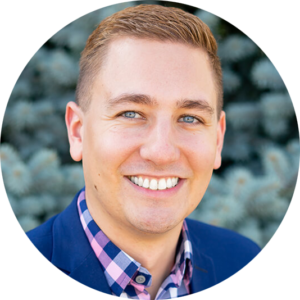Alumni forum: Worried about going back to the workplace? Not sure how to manage it all?
Alumni forum: Worried about going back to the workplace? Not sure how to manage it all?
Three alumni career and life coaches—Sean Allen ’11S (MS), Julie Reisler ’97, Jonathan Meagher-Zayas ’13—give their tips for returning to the office.

Sean Allen ’11S (MS)
Founder, the Real Goal Setter
‘Take care of yourself’
When people come to me anxious about going back to work, I tell them three things. First, use your networks and leverage your relationships. Everyone feels more comfortable when they are surrounded by what they know, so surround yourself with people you know. Our working environments may have changed, and our offices might look different when we return, but just remember that what’s familiar to us puts us at ease.
Next, re-familiarize yourself with your work environment. If you were hired during the pandemic, do a drive-by or ask your company if you can go in before you are actually required to do so. Remember that familiarity breeds comfort, so do what you can to make that happen. We’ve also spent a lot of time on screens during the pandemic. When we get back into the office, remember to make eye contact, listen, and use body language in ways that let people know you are interested in what they have to say.
Lastly, I tell people to cherish the technology that has come into our lives during COVID—Microsoft Teams, Skype, Zoom, or whatever it might be. Two years ago, we weren’t on video calls multiple times a day, but now we are. We use these tools all the time now, which has given all of us a new skill set and makes us more versatile and marketable. This is something good that has come out of the pandemic.
Throughout it all, have fun and take care of yourself. For instance, I keep exercise bands in my office. I shift away from the desk often so I can stretch and do something good for myself. So, get your steps in, take walks with your coworkers at lunch, and develop and strengthen bonds with each other. Know that we can always help one other.
Sean Allen ’11S (MS) is a Los Angeles-based engineer who has worked in the oil and gas industry for the last 10 years. He is also the founder of The Real Goal Setter, where he offers his skills as a certified career coach, resume writer, fitness coach, and real estate agent. As an active University of Rochester volunteer, Allen serves as a mentor within The Meliora Collective and a mentoring and career networking committee co-chair for the Black Alumni Network.

Julie Reisler ’97
Life and leadership coach
‘Don’t bypass your feelings’
I teach and talk about what you appreciate, appreciates. Think about the time you’ve had at home and do an appreciation inventory. Ask yourself, what have I learned during this time? What can I look forward to? What have I missed? Think about what this change and this time are doing for you instead of doing to you.
When you change your perspective, you change your brain. We can attribute this to the science of neuroplasticity—which is about changing the firing patterns in our brains. This is a powerful way to alter your mindset and the way you respond to stress. Typically, it takes between 65 and 100 days of repeated action to make these neural changes.
Think about it: if you repeat negative thought patterns, you will feel more anxious and overwhelmed, which, in turn, will negatively affect your sleep and your overall health. If you can alleviate stress though, you can address so many of the health problems and illnesses that plague so many of us.
Here’s something people can try. If you are feeling anxious, try making a heart connection. That’s as simple as putting a hand or both hands on your heart and slowing down your breath. Then, tune into qualities like care, compassion, appreciation, and gratitude. Think about a person or a pet, a memory or a time that brings you joy, and allow those qualities of your heart to move through your body. Doing so regularly for even just a minute or two helps create what is known as heart coherence, which, science and research shows, can actually change heart rate variability, emit feel-good hormones, and help you to feel calmer and more at ease.
Besides this, I encourage everyone to start a regular meditation practice. I think of this as mindfulness hygiene—it’s non-negotiable for me. I need to do it just like I need to brush my teeth. It doesn’t have to be a lengthy practice either. It can be five, 10, or 15, minutes long depending on the time that you have. If you aren’t sure how to start, check out one of my free meditations along with the mindfulness courses available on Insight Timer, a free app.
Also, find a coach, a counselor, or someone who can help you digest what you are feeling. And here’s another activity you can try. Get your feelings out on paper and then remember to breathe. Brain dump everything you can into a journal, then write some more and see what has shifted for you. You might be surprised.
During this time of transition, remember not to bypass your feelings—don’t block them, avoid them, or distract yourself from them. Give yourself the kind of compassion, space, and grace you’d give a close friend.
Julie Reisler ’97 is a Columbia, Maryland-based author, life and leadership coach, Founder of the Life Designer® Coaching Certification program, podcast host, national speaker, and a faculty member at Georgetown University. She holds a bachelor’s in psychology from the University of Rochester, a master’s in coaching from the Maryland University of Integrative Health, and more than 12 certifications in health and wellbeing.

Jonathan Meagher-Zayas ’13, MSW, MPA
Social sector career coach
“Advocate for what works best for you.”
I’m passionate about career coaching in the nonprofit sector. I am also a self-described “equity warrior” and a lot of what I’m hearing from people has to do with issues of fairness and inclusivity.
For instance, some people have really struggled with remote work. They don’t have the technological support nor the resources to make it work easily. For those who have been able to work remotely, they’ve benefitted from the extra time at home. Not having a commute frees up time to spend with family and to do the things they most enjoy. People are concerned about how that will change when they go back to the office. I work with them to help set boundaries and identify the things in their lives they must focus on to be healthy, contributing employees. This can include exercise, healthy eating, and making sure to take technology breaks.
People in historically marginalized groups face distinct challenges—some of which have been alleviated by working from home. For instance, some tell me they experience fewer microaggressions in the remote workspace. Those water cooler conversations about stories in the news don’t happen as often, which is a relief because, in person, they are often asked for their opinions, as though they speak for the people who look like them.
People also have ongoing safety concerns, especially now with the Delta variant. Many in the nonprofit world work with youth and communities who aren’t vaccinated. They are worried about their own safety as well as the safety of their clients. There are no easy answers to this, but I advise people to talk to their supervisors and do what they are comfortable with.
Many people want a more integrated life versus the “work-life balance” that has been talked about for many years. They want to be excellent employees and they want a full life outside of work. They don’t want to be tied to one desk. Instead, they want the flexibility to work from home if need be or even in a coffee shop, for example, if that means saving and maximizing valuable time between meetings. Since this kind of flexibility increases productivity for many, it’s important for employees to talk to their supervisors about what they need to be the best they can be.
Jonathan Meagher-Zayas ’13, MSW, MPA, is a Rochester, NY-based nonprofit capacity building strategist, community engagement specialist, social sector career coach, social worker, and policy analyst. He’s also an award-winning fundraiser and consultant on racial justice and equity issues. Additionally, Jonathan serves as the director of agency advancement at Villa of Hope, and he holds several other consulting and volunteer leadership roles. Meagher-Zayas is a mentor within The Meliora Collective and has served as a volunteer for the University’s diversity and inclusion programs.
Learn more
Looking for more career information and guidance? Visit our “Career Conversations” webinar library, get connected to a career coach, and join The Meliora Collective—the University’s online unique platform for professional exploration.
— Kristine Kappel Thompson, August 2021


